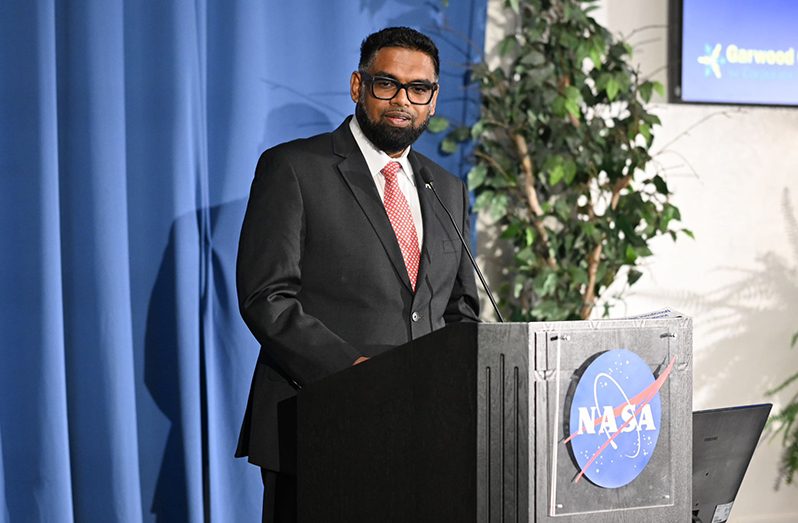–President Ali says, emphasises AI development must tackle food, climate, energy insecurity, and other global challenges
TURNING today’s challenges into tomorrow’s tech-powered opportunities with the use of Artificial Technology (AI) is a strategy proposed by President, Dr. Irfaan Ali, who called on global leaders to use open AI and digital access to bridge the divide.
Dr. Ali provided advice on the use of AI while delivering the feature address at the Spring 2025, Berkeley Innovation Forum, California, United States.
“AI must serve rather than replace humans. It must empower rather than exploit and uplift rather than marginalise. Only through such reimagined vision where AI is directed towards the common good can we ensure the next era of globalisation is one of conversion not division,” President Ali firmly said.
As the President reflected on digital revolution throughout history, he had pointed out that “big data,” robotics and the internet are shaping economies at an unprecedented speed, concentrating technological power in a few hands.
“Today, as AI and automation redefine industries, there is growing backlash against globalisation, rising populism and increasing disparities between the developed and developing world,” the President noted.
In that regard, he said that in the late 20th century, globalisation was expected to narrow economic and technological gaps between developed and developing nations, through international trade, investment and technology transfer.
The digital revolution was also projected to democratise access to education and knowledge, fostering competitive knowledge economies in developing nations, he added.
“The reality has been different,” President Ali posited.
While there have been some benefits derived from globalisation, President Ali said that its impact has been uneven and as he described, “disappointing.”
Many poor countries are still vulnerable and face a number of challenges such as the narrow resource dependency and the income inequality widening, President Ali said.
“The digital divide persists as inadequate infrastructure keeps many developing countries reliant on imported technologies, limiting their ability to compete in high tech and knowledge-based economies,” Dr. Ali noted.
He then provided some statistics to support his points. Dr. Ali said that Oxfam has noted that 60 per cent of the world has grown poor.
Dr. Ali further related that developing countries are facing a deepening debt crisis, with many nations now spending more on debt interest than on essential services like education and health care.
“By the end of 2023, total debt in developing economies has surged to 206 per cent of GDP, nearly double the 2010 level,” he said, while highlighting several challenges that nations are facing because of the digital divide.
AI AND GLOBAL RELATIONS
Owing to the challenges of today, President Ali underscored that AI is poised to usher in a new era that could redefine human civilisation.
“It promises an era that will bring not just economic and political shifts, but also a profound rethinking of human purpose, but there are fears also, about whether AI will further consolidate power in the hands of high-tech corporations, making them more powerful and outside of the reach of governance,” he said while outlining other concerns regarding AI.
The Guyanese Head of State said that there must be a positive approach to AI.
“I therefore wish to advocate for AI to be developed as a global common and aim at solving the common good. This, I believe, will ensure that its benefits will be shared equitably across nations, particularly in the developing world, just as the natural resources of the planet,” President Ali said.
He further stated that AI could enable nations regardless of their economic standing to leverage this transformative technology for critical sectors such as healthcare, education and climate mitigation.
“When made available to everyone AI could level the playing field, reduce inequalities and empower the Global South, helping us overcome systemic barriers to development, economic opportunity and technological progress,” President Ali said.
ETHICAL STANDARDS
He emphasised the urgent need for ethical oversight in AI development, calling for global regulations, value-driven frameworks, and strong governance to ensure the technology upholds human rights, privacy, and academic integrity.
He urged the research community to prioritise sustainable and inclusive strategies as AI continues to evolve rapidly.
“We cannot allow AI to continue at the pace it is being developed at without these important governance mechanism. We can ensure that the technologies’ advancement is used responsibly, guided by the principles of sustainability and inclusivity and directed towards improving lives across the world, particularly in areas that need it the most,” Dr. Ali said.
TACKLING THE DIGITAL GAP
While the President spoke extensively on how AI could be used to target some of the world’s most prominent issues, he did not stray away from addressing the digital gap in developing countries.
He gave his proposal on how an AI strategy can be developed to address the digital divide.
“It is essential for these countries to adopt a dual approach as they work to digitise their economies…By doing so, they can bypass outdated systems, accelerate their development and harness the full potential of AI to drive progress in key sectors like healthcare, education and infrastructure,” President Ali said.
He then outlined that one of the powers of AI is that it allows for investment today, to meet tomorrow’s challenges, but in a way that is futuristic.
The President then proposed the promotion of open-source AI tools and models, noting that developing countries could access cutting edge technologies without the prohibitive cost of proprietary software.
He said that this approach allows these nations to adopt AI solutions to the specific needs and context, whether in healthcare, agriculture or education, thereby fostering local innovation and reducing dependence on expensive technologies.
Finally, he said to ensure that developing countries can fully participate in the AI revolution and bridge the technology gap, it is imperative to establish a dedicated AI investment fund, tailored to their needs.
He added: “This fund will provide crucial financial support for AI projects… It is a strategic imperative to create more balanced and technologically empowered global economy.”
“AI holds the power to stitch together what has long been torn apart. AI technology can become a great equaliser, if deployed properly, AI can turn the promise of globalisation into reality for all, not just a privileged few… AI is not just a tool. It is an opportunity. Let us seize it, shape it and share it, because a future driven by AI should be one where no one is left behind,” the President further stated.



.jpg)









